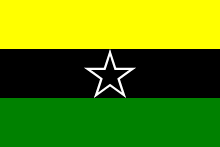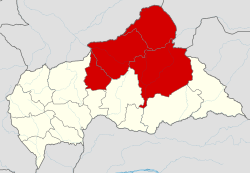Republic of Logone
| Republic of Logone République de Logone | |
|---|---|
 Flag | |
 | |
| Capital and largest city | Kaga-Bandoro[1][2] |
| Government | One-party republic |
| Independence | |
• declared from the Central African Republic | 14 December 2015 |
| Currency | Central African CFA franc (XAF) |
| Time zone | UTC+1 (WAT) |
| Calling code | +236 |
The Republic of Logone, officially Dar El Kuti, is a proto-state internationally recognised as part of the Central African Republic. It was declared independent by the Muslim rebel movement Séléka on 14 December 2015.[3][4]
Background
In March 2013, during the Central African Republic Civil War which began in a year earlier, the Muslim Séléka rebels forced the Christian president of the Central African Republic François Bozizé from his office. This resulted in violence from the Christian anti-balaka militias. The UN sent in MINUSCA troops and scheduled a constitutional referendum for 13 December 2015 and national elections on 27 December in order to stabilise the country. However, Noureddine Adam, the leader of the Central African Renaissance (FPRC), one of the four Muslim Séléka militias, abstained from the scheduled elections. In his view, Muslims and Christians could no longer live together in one country.[2][5] On December 14, 2015, Adam's spokesman, Maouloud Moussa, declared the autonomous Republic of Logone in the northeast of the country. He explained that they wanted first to achieve autonomy within the Central African Republic and eventually absolute independence.[6]
Later, it was announced that the name of the new country was "Dar El Kuti". The name was taken from the historic Dar El Kuti sultanate. The flag of Dar El Kuti was already set the next day in several villages such as Tiringoul, Ndifa and Mele. For the weekend, flag ceremonies were planned in Kaga-Bandoro, N'Délé, Bria and Birao. The flag shows three horizontal stripes in yellow (for the gold of the North), black (that the north was abandoned by the government in Bangui) and green (for the fertility of the land).[7] In the centre of the black strip is a black star. It stands for the struggle of the people in the north for their self-determination. The rebel flag raised by local gendarmerie was taken down in the town of N'Délé by UN peacekeepers.[7]
Louisa Lombard, a professor of anthropology at the Yale University, believes that it is possible that declaration of an independent state is a negotiating tactic for upcoming elections or a method for increasing influence, and that the rebels do not really believe that it is feasible to create a new state.[8]
References
- ↑ "Central African Republic : January 2016 Monthly Forecast : Security Council Report". Retrieved 22 April 2017.
- 1 2 "Muslim rebels declare autonomous state in Central African Republic". Retrieved 22 April 2017.
- ↑ Dembassa-Kette, By Crispin. "Rebel declares autonomous state in Central African Republic| Top News| Reuters". af.reuters.com.
- ↑ Pike, John. "Seleka". Retrieved 22 April 2017.
- ↑ "Rebels in Central African Republic Seek Muslim-Christian States". Retrieved 22 April 2017.
- ↑ "Rebel declares new state in Central African Republic". Retrieved 22 April 2017.
- 1 2 Ori, Konye. "The Republic of Logone: Self-determination and CAR's territorial integrity - Soapbox". Retrieved 22 April 2017.
- ↑ "Central African Republic: CAR Rebel Leader Declares Autonomous State". 16 December 2015. Retrieved 22 April 2017 – via AllAfrica.